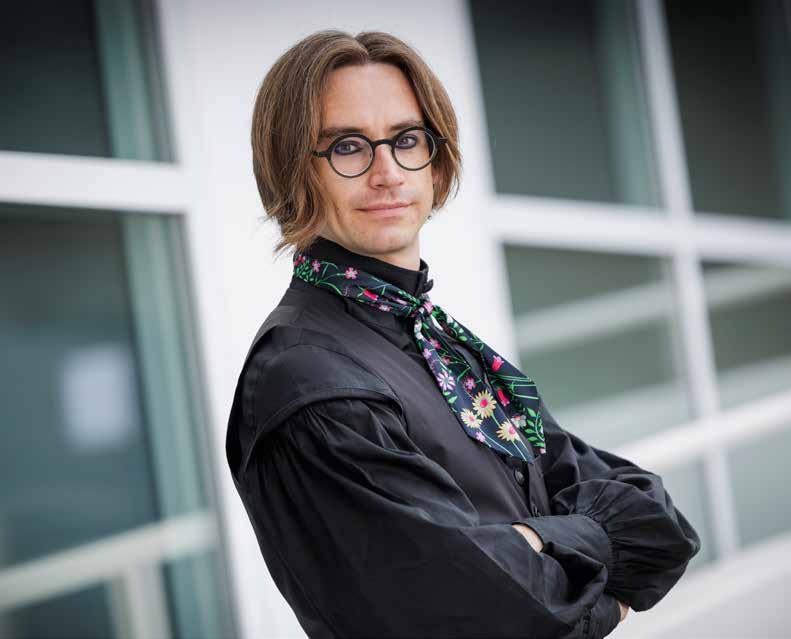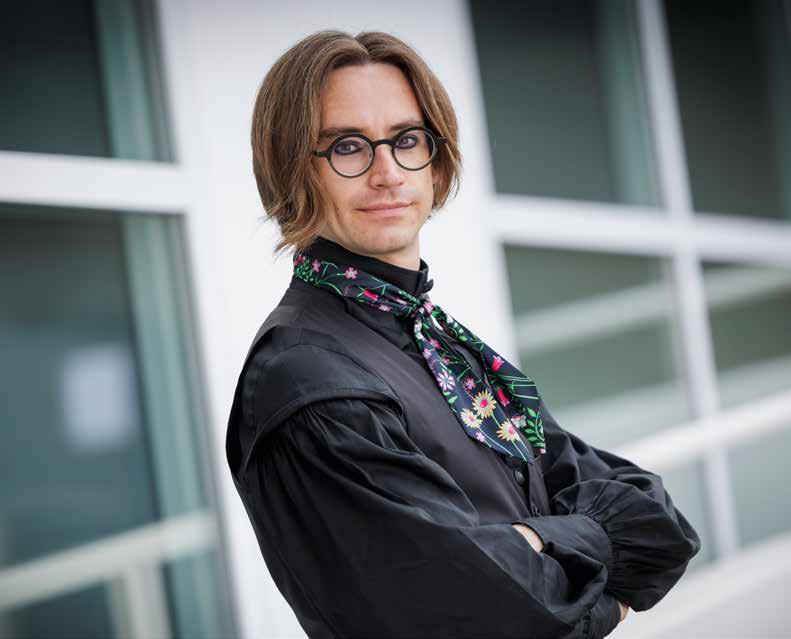
5 minute read
NIGEL VINCKIER: ROMANTICISM AND MATHEMATICS
At first glance, mathematics and romanticism seem incompatible. The romantics, the standard view goes, place feeling above cold reason. Mathematicians do just the opposite. They prefer an abstract, detached world ruled by sterile logic. Nigel Vinckier, lecturer in Mathematics at Group T Campus, cannot agree with this dichotomy. According to him, it is not only outdated, it is also not interesting in getting engineering students excited about the basic science that is indispensable in their studies and later profession.
According to Nigel, views on mathematics cannot be fully explained by internal developments within the discipline itself. Cultural factors also come into play. “Mathematics of the 18th century was more closely connected to the natural sciences, rooted in material reality. Physical examples could be invoked in mathematical proofs if necessary,” says Nigel. “That changed dramatically in the 19th century. Mathematicians then created a more abstract world that we know as pure mathematics. At least in the self-image of certain mathematicians, their discipline became a ‘l’art pour l’art’ and they were paradoxically driven by romantic ideals such as beauty and a yearning for the sublime.”
Romanticism, moreover, offered room for an escape from reality and provided the matching model of the visionary, tragic genius such as Evariste Galois and Bernhard Riemann (both died young), Alan Turing (suicide) or John Nash (schizophrenia). “Even we now understand that the role of the ‘solitary genius’ must not be overstated, the myth continues to resonate”, Nigel continues. “The cult around the recently deceased theoretical physicist Stephan Hawkings is a good example. All this shows that mathematics and romantism have more in common than you might think. This is perhaps most true of the image of the practitioner. You could call the view we have on (pure) mathematics a child of 19th century romantism. With it good and its bad sides: an abstract and abstracted world, an ideal for a pure discipline with values of beauty and rigour, but also elitist, male and overstressing the importance of the individual. Even if we bear in mind that this is a (self-)image of mathematicians, rather than how science actually evolved, we can learn something from it.”
Teaching
Nigel graduated with a master’s degree in Mathematics from Ghent University in 2014. He then took a postgraduate course in ‘Logic and Philosophy of Science and Mathematics’, before moving to VUB in Brussels to do a PhD with Prof. em. Jean-Paul Van Bendegem on ‘Philosophy and Mathematics’. As a PhD student, Nigel also practiced a limited teaching assignment that he particularly liked. To such an extent that in 2018, he decided to abandon research in favour of teaching and started working at Group T Campus in Leuven as a lecturer in the Teaching and Research Unit ElectronicsICT. Currently, Nigel teaches mathematics and programming courses in the first and second phase of the bachelor. In parallel with his teaching assignment, Nigel is pursuing another master’s degree in Computer Science as a working student.
“Teaching is my true calling and engineering students are my favourite audience”, says Nigel. “Even though their attitude towards mathematics is usually ambivalent. They obviously know they can’t do without maths but that doesn’t mean they necessarily like it. Some regard mathematics as a ‘necessary evil’. My job is to arouse and fuel intrinsic motivation for the subject.”
Useless
One obstacle Nigel often encounters is utility thinking. “Some engineering students tend to regard anything that is not immediately useful as less relevant or even redundant. While there are plenty of examples of discoveries that only prove their usefulness much later. Take finite geometry, for example. It was developed in the 19th century and is now indispensable for writing error correcting codes for CDs.”
“Besides, knowledge doesn’t always have to be useful to captivate”, Nigel continues. “In the neoliberal zeitgeist, what doesn’t show its immediate concrete application is met with hostility. Just look how the cultural sector and liberal arts have to fight for their survival.
Yet no one wants to live in a society without art, literature and beauty. In this context, the question ‘why is this useful’ is not innocent. It is a question about justification. But sometimes we cannot see the application yet, or it seems too vague to put one’s finger on it. A path towards usefulness can consist of steps that seemed useless in themselves. Society has to grant a discipline or intellectual activity the freedom to develop itself liberated from the burden of immediate applicability. So the conclusion can be: it’s important because is useless! Or at least: it may have a practical purpose, but that’s not my personal reason to pursue it. Not unlike sex, for that matter.”
Intrinsic
In any case, the intrinsic motivation that Nigel promotes is at odds with utility thinking. “Intrinsic motivation is a feeling that comes from within and is independent of external interests or pressures. The goal is to create intrinsic reward mechanisms and progressive challenges to give students a positive sense of achievement while doing difficult things. This starts by creating a positive mindset. A key tool for this is humour. I try to spice up lessons with banter and jokes. I also try to make students curious. Certainly don’t shy away from difficult topics. It just increases intrinsic motivation because overcoming it brings satisfaction. The more satisfying, the more students will also love the subject, even if it is theoretical and abstract. Once you have tasted the romantic side of mathematics, the taste never leaves you.”
Yves Persoons











